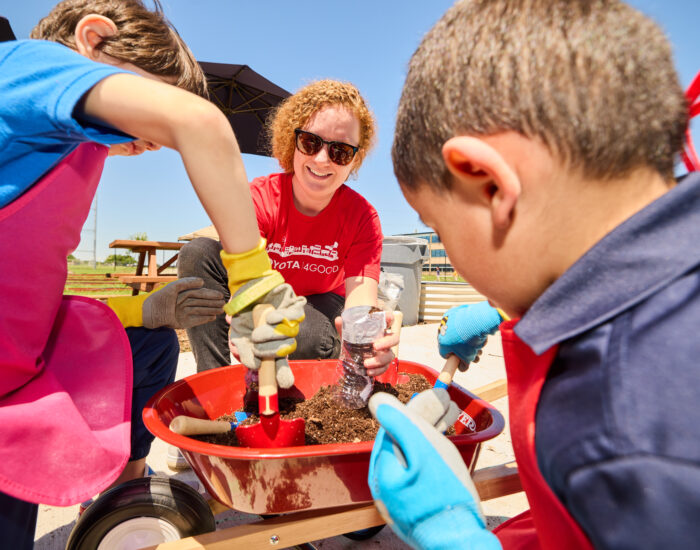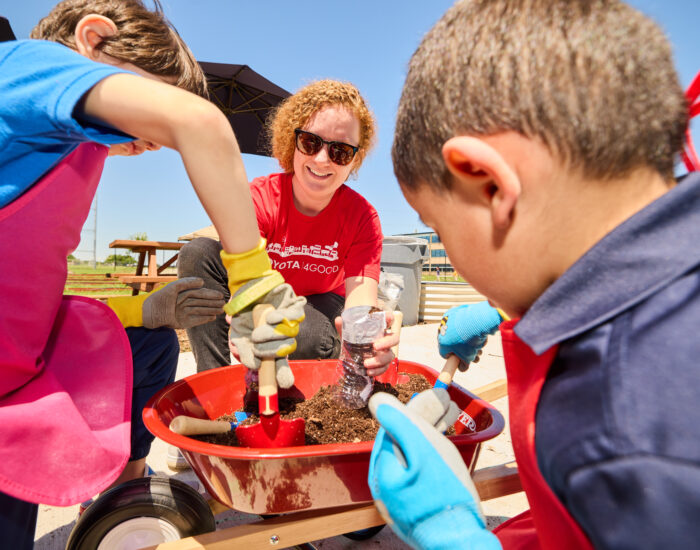Toyota expands support to six Roots & Shoots events in 2024 to build excitement for kids to work for a cleaner, healthier planet.
In a world increasingly aware of environmental challenges, building awareness in young people to start small and tackle the issues they care about most can make a big, positive difference, according to the Jane Goodall Institute. It is a belief that Toyota agrees with and why the company has been supporting the institute’s youth-action program, Roots & Shoots, since 2023. The combined effort helps to provide local school groups with opportunities to participate in projects that support the environment, finding ways they can take personal actions to improve the planet – and the number of program events is expanding here in the United States.
The idea isn’t just to get kids out of the classroom and into nature – although that’s part of it. The Roots & Shoots program offers tools and curriculum to teach students that small things they do today to help humans, animals and the environment can add up. Using tools like the 4-Step Formula, the program encourages participants to imagine positive actions, such as community-service projects that will help them connect with each other, projects they can carry out with their friends, classmates, and larger community.
“We show kids how they can take something they’re interested in, find ways they help address a problem, and then be part of the solution,” said Nikki Tanzer, environmental engineer at Toyota San Antonio. “I’ve never seen a bored kid at one of our events.”
During the first year of Toyota support, there were four combined events in the U.S., which received positive feedback from participants. In 2024, Toyota’s support expanded to sponsor six Roots & Shoots events across the U.S. in collaboration with local agencies and schools. Students in Dallas, San Antonio, Kentucky, West Virginia, Tampa Bay, and Los Angeles learned about local plants, animals and environmental problems. They were challenged to come up with small ways to make a big difference. They walked away energized and more aware of their communities.
“We see a lot of light-bulb moments at our events,” Tanzer said. “It’s important for us as a global leader to work with our local communities. It’s just part of our DNA to care about our environment where we work and where we live.”
Here’s a rundown of some highlights from Roots & Shoots events supported by Toyota this past year:
DALLAS – Bottles to Bounty
At the Dr. Elba and Domingo Garcia West Dallas STEM School, Toyota TERRA volunteers worked in collaboration with Roots & Shoots and Brother Bill’s Helping Hand, a local community food pantry, to host an event named “Bottles to Bounty.” The event required advance preparation, transforming 120 used plastic water bottles that had been collected both on Toyota’s campus as well as from Brother Bill’s Helping Hand into planters by cutting them and adding wicks.
On the day of the event, which was hosted at the West Dallas STEM School on Earth Day, more than 100 students from the school participated by rotating through various activity stations. The stations were designed to help them learn about local plants and get their hands dirty in the school’s learning garden. The children and adults even cooperatively constructed a greenhouse from used plastic water bottles and bamboo stalks, demonstrating how recycling can lead to positive environmental outcomes.
SAN ANTONIO – Bats and Bees
In San Antonio, over 60 students from Hidden Cove STEAM Academy visited Toyota Texas, where the Tundra and Sequioa are assembled, to learn about local wildlife and their habitats. The day was filled with engaging talks from naturalists, including experts from Bracken Cave, who shared fascinating facts about the roughly 15 million Mexican free-tailed bats that summer in nearby Garden Ridge. Students also learned about the vital role of pollinators, such as bees, in maintaining healthy ecosystems. This hands-on experience not only educated the children about local wildlife but also instilled a sense of responsibility for their environment.

KENTUCKY – Removing Invasive Species
At Toyota’s Georgetown vehicle assembly plant in Kentucky, where Toyota assembles the Camry, RAV4, and Lexus ES, 55 seventh graders from Paris Middle School participated in an event focused on combating invasive species. Students learned about the detrimental effects of plants like Japanese honeysuckle and duckweed on local ecosystems, including harm on wildlife in area ponds and effects on water quality. They got to use nets to scrape the weed from the on-site pond and pulled down invasive vines in the woods near the facility.
The participants also learned how to remove thistle from pollinator prairie areas from Roundstone Native Seed, an Upton, Kentucky-based seed supplier of local grass, wildflower and legume species. The horticulturalists from Roundstone shared a lesson in meadow management from experts that have been growing and supplying high-quality regional plants to the Eastern U.S. for more than 20 years. The event highlighted the importance of maintaining native habitats and the role that young people can play in preserving biodiversity.

WEST VIRGINIA – Animals Galore
West Virginia students engaged with experts from a local non-profit, the West Virginia Division of Natural Resources, and a professor from Marshall University to learn about native birds, wildlife conservation, and the impact of invasive species on local habitats.
The Three Rivers Avian Center, a local non-profit bird rescue center, brought owls and a raven, and discussed threats to these species and how they ended up at the rescue center.
An expert from the WILD program at the West Virginia Division of Natural Resources also provided students with hands-on learning experiences, such as handling furs and live turtles, to help foster a deeper understanding of the natural world.
Professor Rick Gage from Marshall spoke about the impact of Sericea Lespedeza, an invasive weed introduced decades ago to provide hay for farmers in the state. Unfortunately, the weed has become invasive, outcompeting other plants for water and nutrients. The Roots & Shoots event participants were given gloves and tools to help remove as much of the weed as they could from the surrounding area.

LOS ANGELES AND TAMPA BAY – Community Basecamp programs
In September, Toyota joined forces with various organizations in Los Angeles, Calif. and Tampa Bay, Fla. to sponsor and support the Roots & Shoots mission at larger off-site events. The gatherings were rallies to support and inspire local action and promote positive change. Jane Goodall herself attended the events, sharing her wisdom and encouraging young people to take an active role in conservation.
In Tampa Bay, the basecamp’s focus was on protecting and restoring Florida’s largest open water estuary. The Los Angeles base camp coordinated efforts with local partners that included Rotary International, Wallis Annenberg PetSpace, L.A. Recreation & Parks, and the Port of Long Beach to combat food insecurity and promote native gardening at the International Day of Peace celebration held the same month in the San Pedro area, near Toyota’s operations that process vehicles coming in from Japan. The events showcased the power of community engagement in addressing environmental challenges.
Founded in 1991, Roots & Shoots started when Goodall met of group of 12 students in Tanzania who felt helpless about environmental problems in their communities. One of those students went on to become Tanzania’s Environment Minister. The program now has chapters in all 50 U.S. states and in more than 75 countries. Millions of students have worked on Roots & Shoots projects over the past 35 years.
In a 2023 interview with former Toyota Regional Environmental Sustainability Director Kevin Butt last year, Goodall explained that Roots & Shoots is a way to help build hope for young people and get them involved in constructive change while there’s still time.
“You get the young mind thinking in the ways they need to think if we’re going to change the direction we’re headed in now,” Goodall said. “The young people who are in these programs who understand nature, they become passionate defenders of nature.”
Go to Source







